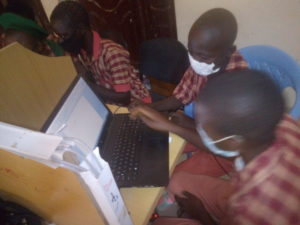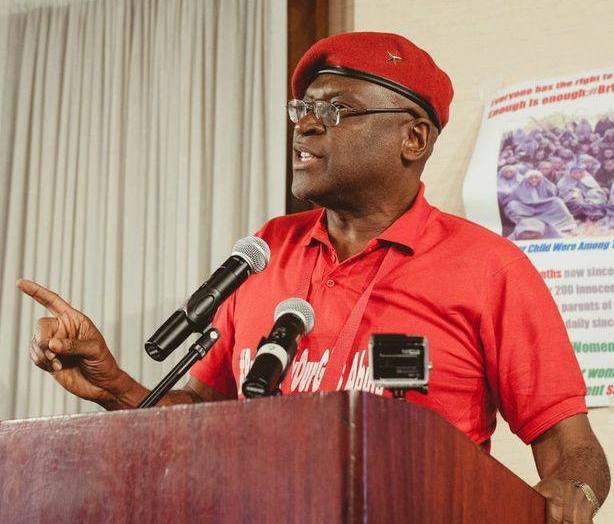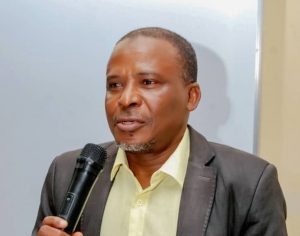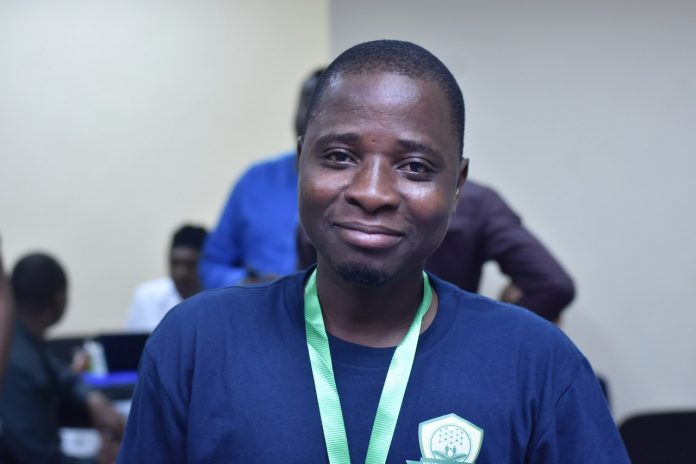A deeply unfortunate emergency prevented Mallam Y. Z Ya’u from attending the Memorial Lecture for Dr Yima Sen Wednesday, November 11th, 2020. He was billed to speak for the pro-democracy community at the Memorial. Below is what he would have said. This must rank as the most succinct capture of the radical trajectory in the past three decades. But things must, indeed, be so bad in the country for a Mallam YZ to roll up his sleeves. Read on!

The author
By Y. Z. Ya’u
Memorials like this are important because they allow us to reflect and think about the future. Memory itself is an important resource. But often we tend to miss its significance. While paradoxically, it is about the past being recalled in the present, its uses actually lie in the future. It is within this context that I want to situate our dear departed comrade, Yima Sen. In doing so, I would like to apologize to his family, both immediate and broader, for I will like to appropriate him for us. The ‘us’ here is a group of highly patriotic, detribalized Nigerians who dare to dream of an alternative, better Nigeria where justice would flourish. They dream of Nigeria as a peaceful country where exploitation of man by man would be history. And they see Nigeria as a country capable of harnessing its endowment, both natural and human, to meet the needs of every citizen, irrespective of sex, tongue, faith or territorial placement. Yima Sen not only embodied the best of these ideas but also lived all his life struggling to see to the actualization of this vision.
When I first met Yima, I did not know his religion or tribe. I did not even know from which part of the country he came. I was not interested in those because, in him, I a saw a trusted soul mate, someone whose ideas and mine matched and we had our eyes on the same direction. He was just Comrade Yima. My first knowing of Yima was on a platform for justice, to end apartheid in Southern Africa. He was not our age, having been born a little earlier than many of us who eventually became his friends but we were shaped by the same generation of ideas. We had graduated from the university and reflecting on our activism on campus as champions for the struggle against apartheid, we thought we should continue until it was completely dismantled. So, we formed the Nigeria-ANC Friendship and Cultural Association (NAFCA). At the time, Yima was working in Lagos and he became a key figure in the movement, arguing that injustice in any part of the world was injustice to Nigeria.
About the same time, a radical feminist movement had resulted from a conference organized at Ahmadu Bello University, Zaria on Women in Nigeria. Taking the name of the theme of the conference, that platform became known as Women in Nigeria, (WIN). WIN posed fundamental questions about oppression and liberation of women in the country. The obviousness of its central thesis was a Marxian credo of class oppression conterminous with gender oppression, resulting in the double oppression statement that women suffer, first as members of subordinate classes and second as members of subordinated gender. For WIN and its members, therefore, ending class oppression would not automatically end gender oppression. As such, a simultaneous struggle against both gender and class oppression was needed. It, therefore, thought to mobilize the collective agency of both women and men against patriarchy. This was why WIN was both unique and experimental: a feminist organization that had both male and female as members and both genders were eligible to play leadership role. Yima and Lona, his wife, were both members and played critical role in the movement which saw their house in Lagos as sort of secretariat for the organization. WIN was not an easy conversation, given that it carried along a tension between these who saw class agency as primary and those who saw gender as the most urgent task. In the end, the organization ran into a major ideological crisis from which it never recovered. But Yima remained faithful to the principles of the organization and continued to be an exemplary feminist to the very last.
The mid 1980s were heady years. They were defined by a collective search for direction and meaning for the country following the failure of the Second Republic accompanied by two military coups. The government of IBB had, against all popular opposition, imposed the Structural Adjustment Progrmmes (SAP) cooked by IMF and World Bank, which only served to destabilize the country. Millions of people lost their jobs, social services such as education and health suffered massive underfunding. The country’s currency was subjected to a free fall. The result was de-industrialization and contraction of the economy, increased impoverishment of the population and high unemployment. These generated protests, especially led by students across the country that came to be known as the anti-SAP protests. The authoritarian regime responded with crackdown and massive arrest and detention of student leaders and labor activists as well as other measures to destabilize unions. While the government was, to a large extent, successful in crushing traditional mass movements such as the student and the labour movements, there arose a new form of organization, first using the instrumentality and language of human rights but focused on democracy and national liberation, resulting in the formation of pro-democracy movements like the National Front and eventually the Campaign for Democracy (CD). The CD was like the absorption of all the energies in both NAFCA and WIN as well as the remnants of the student movement plus the left-wing constellation in the academia. Yima was a central figure in this history and the struggles that unfolded. The central demand of CD was to end military rule and therefore also campaigned against the military planned and controlled political transition programme which seemed to be interminable as IBB kept extending the handing over, internally subverting his own process. This very basic demand of CD could later return to haunt as it, imploding in a crisis, like WIN, from which it could not recover.
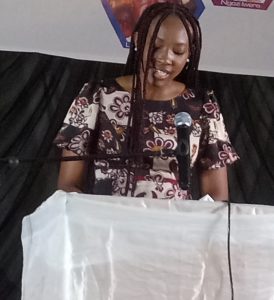
Faminmi Sen, Dr. Yima’s younger daughter reads his citation at the Memorial Lecture
Consequently, the IBB had no option but to finally allow elections to hold but only to cancel the result of the election at the last moment, refusing to allow the winner of the Presidential election to assume his mandate. This led to pro-democracy protests, led initially by CD and trade unions to be joined later by NADECO, which was a coalition of politicians who felt shortchanged by the military. The insertion of the CD into a struggle to reclaim the mandate of an election for which it had called for its boycott and the complication of the struggle by its apparent regionalization led to a tension in the pro-democracy movement and subsequently to a split. While the split was largely fueled by ideological disagreements, the immediate cause was the decision by the Beko-led leadership of CD to get involved with the military coup of Abacha. Superficially, a coalition of activists from the South West favoured collaboration with the Abacha military regime that supplanted the contraction the fleeing IBB left while the other, largely of activists from outside the region, felt that any accommodation with the military would undermine the very foundational demand of the movement which was to end military rule. This split led to the formation of the Democratic Alternative (DA) for which Yima emerged as one of its leaders. The DA had a dual character, as a movement and a political party and therefore it needed a front to carry out the popular struggles while the party needed to concentrate on the principal question of getting power. This was how the United Action for Democracy (UAD) was formed. Again, Yima was part of this.
While IBB was able to destabilize traditional mass movements, Abacha was largely successful in destabilizing the radical pro-democracy movement. From the late 1990s, our tribe began to disorganize and break into ineffectual fractions. Confusion set in and stories of betrayals became the order of the day. Some opted to find a space in the corrupt system we all had committed to fight. Some went to align behind their ethnic and religious lords, becoming in the process, either cranky ethnic chauvinists or bigoted religious lunatics. When some of us became either confused or turned to their inner cocoons of ethnicity and religiosity, Yima Sen remained solid. He did not become demoralized by the constant tales of betray. Instead, he was spurred to continue to use his energy, intellect and commitment to a course that he believed was right.
By the time we transited to civil rule in 1999, we had a movement that was caught unprepared for electoral democracy. As a movement, we had many bruises all over us. Our main platform, the Socialist Congress (SCON) was in crisis by itself. The fronts had fractured. Above all, we had no consensus on how to relate to electoral politics. Some thought it was best to join the mainstream bourgeois parties and influence development from within them and eventually some did. Others sought joining the burgeoning civil society advocacy to get reforms and again a number did that. Some thought that we should monitor the transition and later election so that we can help to create better election environment. Still others thought solace in isolation. A minority remembered we had a political party in the DA which had been dually registered and available to contest elections. Their electoral experience was a dismal failure. In the end, we lost the party and almost lost the core organization in the confusion. Yima was part of these debates but his sighs remined fixed far into the horizon, never losing hope, believing that in the end we would be able to overcome.
One of the paradoxes that often get confusing to people is the juxtaposition of peace and revolution, which is seen as bloody and antithetical to peace. Yima was both a revolutionary and a peace maker. There is no contradiction in this: you cannot have peace without social justice and revolution is about establishing social justice without which there can be no peace. In this sense, peace and revolution are two different sides of one coin. You need a revolution in order to make a lasting peace. Since the return to civil rule in 1990 and the increasing spade of ethno-communal conflicts, Yima has been part of many platforms searching for peace in the country. I remember one of the collaborations we had toward the end of the last year. We brought youth from Benue, Plateau, Kano, Kaduna, and a few other places to Abuja for three days, working with them on understanding how fake news and hate speech have catalyzed many conflicts. Yima gave one of the most striking narratives that transformed the perceptions of many of the participants of the conflicts that they had thought they knew better.
Yima spoke to Nigerians about our collective vision. He showed us how we could struggle to attain the vision he has dreamt. He dared us to walk along the path he imagined in attaining this vision. Yima is thus a promise for Nigeria and Nigerians, a promise that is a resource for our struggle to build a better society and country. He is no longer with us but he has left behind a legacy that will shape the tomorrow of Nigeria and Nigerians, the future that we all wish for. We can only do justice to his memory if we keep this hope alive and continue to struggle for a better Nigeria.
We are happy to celebrate Yima (yes, we cannot but celebrate him because his journey on this earth was a gift to humanity!) because he struggled with us, spoke with us and lived an exemplary life that we are proud of. But we can only do justice to the memory of Yima and make that memory the resource of tomorrow if we interrogate our dwindling strength, lack of coherence and clarity of our ideas. What is it that has made many of us to lose faith in the change that we have spent decades working for? Is it that we have become impatient that the change is not fast coming? Is it that the passage of time has seen us lose clarity on our ideas? Is it that age has meant that we are incapable of sustaining our passion for change and deploying our human agency for change?
Whichever it is, we need to rethink how to get back to our trajectory. Things have moved from bad to worse in the country. We have harvested a civilian rule but we have harvested the worse of its most unaccountable form. More than ever before, the question that always defined Yima, that is justice, is even much more urgent now. We cannot get justice with an unaccountable government and we cannot get an accountable government in the context in which class interest is the determining factor in what a government does or does not.
I will like to conclude by acknowledging one resource that Yima Sen has bequeathed for us. This is his love and commitment to ideas as building blocks of society. Having ideas is potential power, power not in the sense of an institutional repository of control but in a much more transformative sense, since power itself, that ability to transform society, is constituted by ideas. We have ideas; therefore, we have power to transform Nigeria to the ideals we imagine. That requires the deliberate, tactical and strategic deployment of that power, which is the ideas we all have been articulating. Rest in peace Comrade Yima, Sleep well!
Mallam Ya’u works at CITAD, Kano



